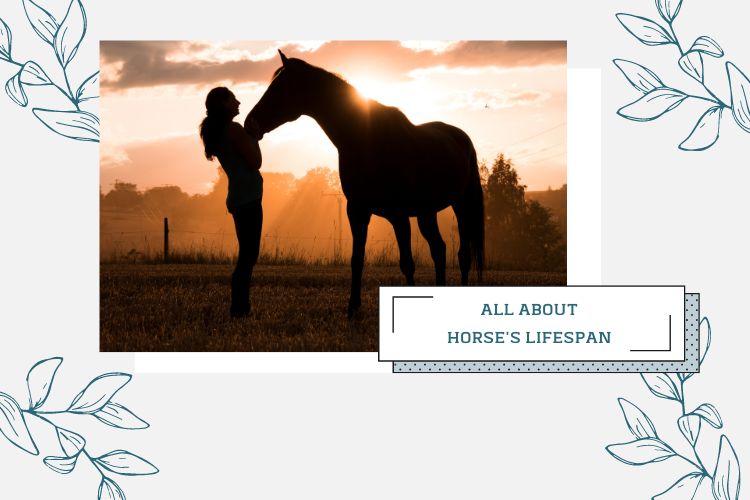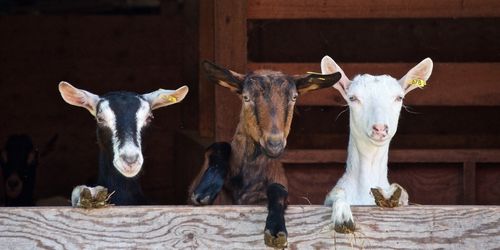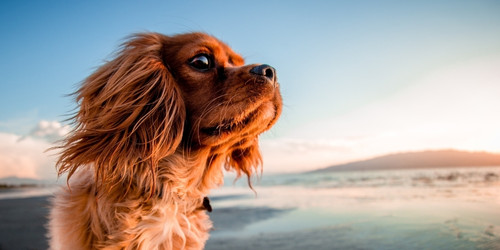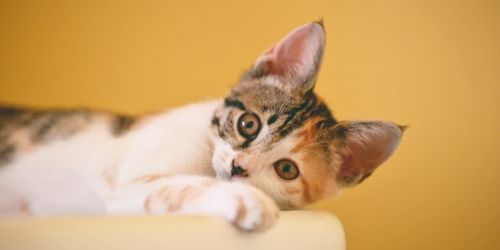Some of the links on our website are affiliate. By making a purchace via our links, you help us create new content and support animal shelters and funds
Horse Lifespan 101

Horses are some of the most common domestic animals. Although they are used less often for labor and transportation these days, many people still raise them for riding and as pets.
Domesticated horses have an average life span of 20–30 years, although some individual horses have lived as long as 50 or 60 years with the right care.
Horse lifespan and breed
As with other domestic animals, the average lifespan for horses is a range. Many factors affect how long a horse will live within that range, including the breed.
Some horse breeds routinely live to the upper boundaries of this range. Usually, smaller horse breeds and ponies live longer because their bodies experience less stress from carrying around heavy weight.
Arabian horses tend to live for 25–35 years. This is one of the most famous and sought-after horse breeds for show horses and racing. The same factors that make these horses so popular among owners—their endurance and good health—also help extend their lifespans by making them resilient against many common health problems that can shorten a horse’s lifespan.
Haflinger horses are another breed of horse with a fairly long lifespan, usually around 25 to 30 years. These horses are native to Austria and northern Italy’s Alpine areas.
They were bred for their hardiness and ability to withstand cold temperatures and extreme weather, which also makes them more resilient when it comes to withstanding conditions that might kill more delicate breeds. Haflinger horses are also relatively compact, which helps them live longer.
Appaloosa horses, native to North America, also have a long lifespan of 25–35 years. Appaloosa horses are easily recognizable by their dappled coats. Appaloosas were bred for their sturdiness, which is probably what helps them live so long compared to other breeds.
On the other end of the spectrum, there are some horse breeds that have much lower life spans. For example, draft horse breeds tend to live much shorter lives because they are so large that their bodies have to work extra hard to keep them alive. Draft horses also tend to be working horses, which is a more stressful existence than relaxing in the pasture.
Friesian horses have some of the shortest lifespans of any horses, with average specimens living only about 16 years. While these horses are draft horses, they are far from the largest, and much bigger breeds have longer lifespans, so this is not the explanation for their short lives.
Friesians are prized for their distinctive appearance, including shiny black coats, which unfortunately led to lots of inbreeding. Individuals from this species have lots of health problems as a result.
Akhal-Teke horses are another breed with a relatively short life span. The average life span for these horses is only around 20 years. Still, these rare Turkmen horses are prized for their shiny coats which have a unique metallic sheen.
Other short-lived horse breeds include mustangs, Clydesdales, and Andalusians.
Horse life expectancy and other factors
There are so many other reasons than just breed that determine why one horse may live longer than another (as you can tell by the range in life span given for each breed). Here are some of the most important factors that determine a horse’s lifespan.
Domestication.
Although horses are mostly domesticated, there are still a few breeds of wild horses left, such as Mustangs. In general, wild horses live much shorter lives than domesticated ones. They don’t have protection from predators or regular access to food as domesticated horses do.
However, wild horses are free from other factors that shorten the lifespans of their domesticated counterparts, such as overwork and common diseases.
Purpose.
Although people rely on horses less for labor today in the days of mechanization, many horses still are working animals. Depending on their working conditions, horses may live shorter lives due to stress and mistreatment.
For example, thoroughbreds have a shorter lifespan than similar breeds, not because they are inherently more prone to disease, but because many thoroughbreds are racehorses who are pushed to their absolute limit when working.
Exercise.
Although overwork is a common cause of premature death among horses, the opposite is also dangerous for these noble animals. Horses need regular exercise to thrive and be healthy. A horse that stays in its stall all day (unless it’s on enforced rest for a health problem) will become seriously ill.
Remember that these animals were bred for their usefulness to humans, and they were literally bred to run around and be active for hours on end.
Nutrition.
Horses have a reputation for being very sensitive animals, and that includes what they eat. Horses need small, frequent meals throughout the day that are nutritionally balanced to meet their needs (for horses, that means meals that are mostly hay).
Horses that don’t get enough food quickly develop chronic health conditions such as ulcers that lead to serious health complications and even death. Besides nutrition, domesticated horses also need adequate medical, dental, and hoof care.
Information is unclear about the effect of sex on the longevity of horses. However, for most mammals, females tend to live longer than males. Part of the answer is biological, as initial research ties the XX chromosome, which is what determines female animals, to longer life spans.
Another explanation is that male horses tend to be larger than female ones and engage in more risky behavior. In the wild, as soon as a male loses his strength, he is driven out of his herd.
However, sex is not a hard-and-fast determinant of horse longevity. Some females live shorter than their male counterparts, especially if they are bred often, because the stress of pregnancy and birth repeated over and over again damages their systems. The oldest horse ever recorded was a male, a horse named Old Billy, that lived to be 62, showing that it’s not a rule that females live longer than males.
Health issues shortening horse life expectancy
Horses are unfortunately prone to many health issues. Different breeds are prone to different problems: for example, owners of Appaloosa horses frequently complain about eye infections. However, some health problems are universal for this species.
One of the most common health problems that horses face is colic. Colic is an unpredictable pain in a horse’s abdomen that has many different causes, making it very difficult to prevent. Colicky horses will have trouble passing manure and show signs of pain in their bellies.
While most colic is treatable, it can cause other complications, such as health problems and the leaking of toxins in the stomach. Sometimes, colic results in putting the animal down.
A surprisingly common cause affecting a horse’s lifespan is a rotten tooth. Most animals that have teeth need them to eat, but horses especially suffer from rotten or missing teeth. Horses without all of their teeth can’t eat properly or chew their food, which sometimes leads to more serious digestive issues such as colic.
Dental issues are not always clearly visible. A horse could have a hidden abscess or other problem that is making eating painful. That is why regular dental care and monitoring horses for any change in eating habits is important.
Obesity is another health issue that leads to a whole host of complications that could shorten a horse’s lifespan. Horses that are obese struggle with their cardiovascular health, just as humans do.
However, obesity in horses causes other health complications, such as laminitis, a condition that often causes deadly hoof inflammation and arthritis.
Most older horses have Cushing’s disease or PPID, a pituitary gland disorder that causes a hormone imbalance. Although PPID can become deadly if not treated on time, early detection and treatment can extend a horse’s lifespan into the upper bounds of the breed’s range.
How to extend a horse’s lifespan?
Horses live an average lifespan of 25–35 years, although this varies depending on many conditions. Different breeds have lots of variation in terms of lifespan. Other factors contribute to a horse’s lifespan, such as levels of activity, habitat, nutrition, and chronic health conditions.
If you are caring for a horse at any age, you can extend its lifespan by giving it access to regular medical care. Veterinary check-ups need to start young, not just when the horse starts to slow down, to catch any chronic health conditions. Adequate medical care for horses doesn’t just include veterinary visits but also dental care and visits to the farrier who will care for the horse’s hooves.
Horses also need adequate exercise and rest. Too much work will overwork the horse’s body (see the short lifespans among racehorses), and too much idleness will cause other health complications. Pet horses should get free range of a paddock at least once a day, while farm horses need some rest from their work.
Finally, adequate nutrition is also very important for keeping a horse healthy. Horses that don’t get enough to eat or not enough nutritional food develop stomach problems such as ulcers, while overfed horses become obese. With horses, as with humans, moderation is key.


